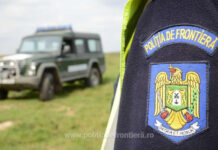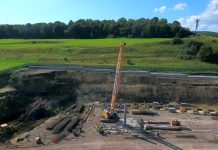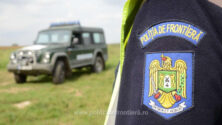According to the financial press, Ilchovski owns more than 10,000 ha of agricultural land in the south of the country. Part of the farmland was bought from the owner of the „University of Craiova” Football Club, Mihai Rotaru, who owned 5,700 ha in Olt and Dolj, but who, in 2022, quit doing business in the agricultural field. The business media show that, in December, Altimir BS Eood, of Karlovo, Bulgaria, owned by Svetoslav Bozhidarov llchovski, bought Rural Capital from Rotaru, a cereal farming business. The Romanian football club owner has not denied the transaction, which can be found using the database of the Romanian National Trade Register House, but preferred not to comment.
Ilchovski has also bought land from other farmers in the south of the country, one of them being Cornel Stroescu, from Mehedinți. Ilchovski purchased Strovar SA and Hastro SRL Șovarna from Stroescu, which both own thousands of hectares of agricultural land.
Ilchovski made shocking revelations in the scandal of former Prime Minister Boiko Borisov, photographed naked with stacks of money and gold bars
Two years ago, Svetoslav Ilchovski made revelations that shocked Bulgaria. The Bulgarian press presented the disclosures Ilchovski made before a parliamentary commission investigating the scandal involving Bulgaria’s prime minister at the time, Boiko Borisov. The businessman made these revelations having witnessed many instances where the fields of politics and business had crossed paths.
Ilchovski developed his business and became one of the largest landowners in Bulgaria in an economic and political climate known for the high levels of corruption – even higher than in Romania – one awash with news about hired assassinations, car bomb explosions, extortion, blackmail and mafia networks. In May, Bulgaria’s chief prosecutor, Ivan Ghesev, escaped with his life after a device exploded in the proximity of his passing official state car.
In May 2021, Svetoslav Ilchovski appeared before the Parliamentary Commission investigating the scandal involving Boiko Borisov. Compromising photos, allegedly taken in Borisov’s bedroom while he was sleeping naked in bed, appeared in the Bulgarian media on June 17, 2020. The photos showed a gun resting on the bedside table, alongside gold bars and stacks of €500 notes. It was the perfect portrait of high-level corruption.
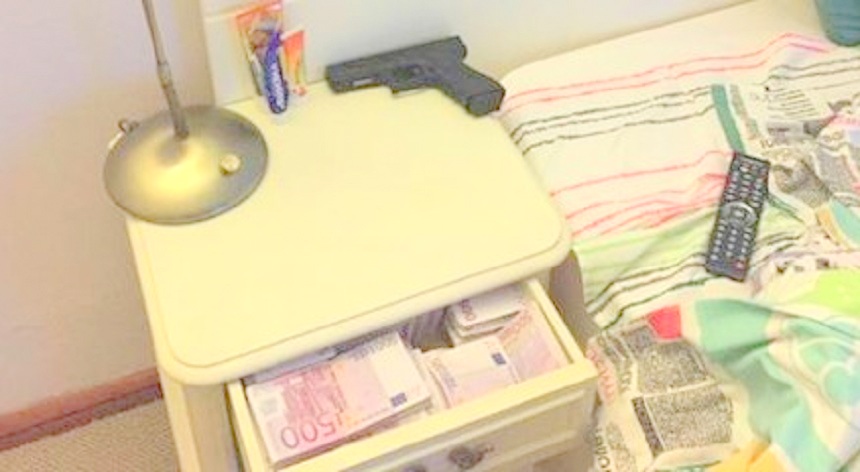
Borisov denied the authenticity of the photos, but later appeared to confirm them, without explicitly stating whether they were real or fake. He suggested that he was being harassed, with the aid of a drone, by the president of Bulgaria, Rumen Radev, who lives in the same area and with whom he has strained relations. In reply, called the accusations ridiculous.
The Bulgarian Parliament launched an investigation and, on the 5th of May, 2022, Svetoslav Ilchovski testified before the parliamentary commission investigating the illegalities of the government led by Boiko Borisov. His testimony shocked the Bulgarian press, primarily because of the spicy details he revealed, of the prime minister’s personal life.
„Svetoslav Ilchovski spoke on a variety of topics, including public scandals involving the Prime Minister of Bulgaria, to which he added some rather spicy details. Everyone was surprised when the agrarian businessman claimed to know the identity of the woman who photographed Boyko Borissov sleeping naked at his residence, with a gun and stacks of euros and gold bars on his bedside table. (…) He refused to reveal her name, but claimed that she was an escort paid 5,000 leva (approximately 2,500 euros) to provide sexual entertainment for the prime minister”, reported the Bulgarian publication „Baricada”.
The combination of politics and business in Bulgaria: pressure, blackmail, and even the RAPE of a businessman in police custody
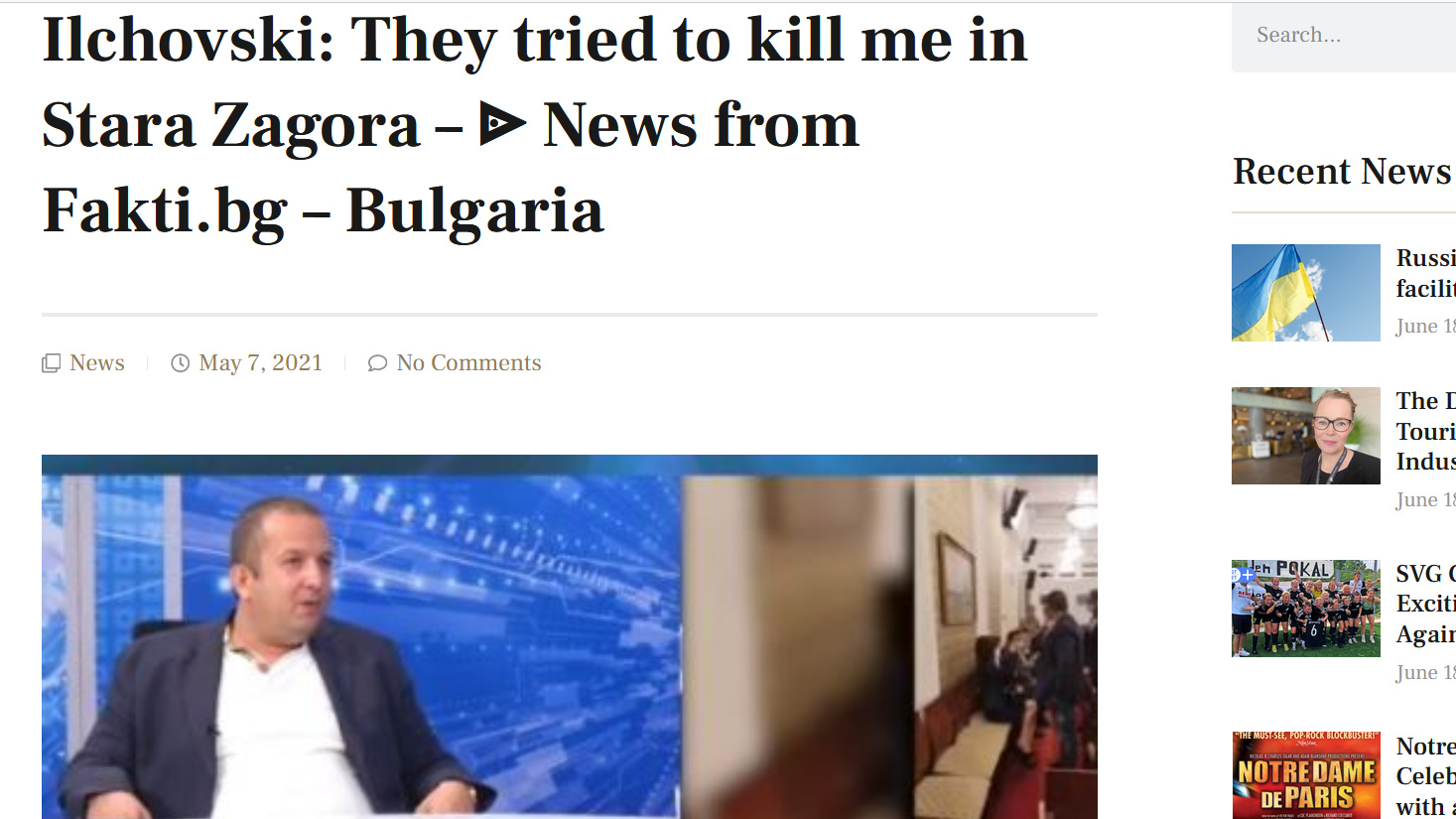
Beyond their spiciness, the more consistent revelations of Svetoslav Ilchovski spoke of the dire climate of the Bulgarian business life, depicting stories of pressure, blackmail, influence peddling, and even the RAPE in police custody of businessman Minyu Staykov. He even accused incumbent Prime Minister Boiko Borisov of being involved in a mafia-style money extortion operation from businessmen.
„Also discussed were the gun, money and gold bars in Borissov’s bedside drawer, the gang-rape of businessman Minyu Staykov while he was in police custody, and other recent incidents and events. According to Ilchovski, the gold in the photos was a birthday present from a wealthy business duo named Ivan <<Pileto>> and <<Tzolo>>.
According to Ilchovski, such behavior is normal in the Bulgarian climate, <<an everyday pattern>>, as he put it. His revelations, wrote the Bulgarian press, confirmed what Bulgarians had long suspected: that every sector of the economy was divided and controlled by businessmen close to the Government, that they were all under the thumb of Boyko Borisov, and that all of the ministers were mere <<puppets on strings> >”.
Ilchovski claimed that he had been blackmailed by people around the prime minister. His accusations targeted one of the owners of the poultry company "Gradus", Ivan Angelov, nicknamed "Pileto"- "chicken" in Bulgarian, allegedly one of Boiko Borisov’s close associates. "According to Ilchovski, Angelov introduced himself as <<the hidden Head of the Ministry of Agriculture and the Food Agency>> during their meeting. Ilchovski claimed that, in 2014, he was forced to start selling grain to Angelov's companies at prices well below market value, in order to avoid "problems", "Barricada" also reported.
Later, Ivan Anghelov „Pileto” sued Ilchovski, requesting the payment of compensation of 7.5 million euros. And this is the way things stood when Ilchovski decided to move his business to Romania.
Ilchovski bought Stroescu’s agricultural businesses
But let’s go back to Ilchovski’s land acquisitions from Cornel Stroescu. Stroescu’s businesses had been built from scratch. Previously, the businessman and his wife had spent some time working in Germany. The couple invested the money they were earning in agriculture. In 2005, Stroescu leased 100 ha, which he got his brother to manage. In 2008, he leased another 460 ha. The Stroescus then returned to the country and established Strovar SA and Hastro SRL. They managed 2,000 ha of agricultural land through the two businesses . Stroescu also owns a poultry farm in Hinova, which supplies over 15,000 eggs to hypermarkets in the area on a daily basis.
In December 2022, the news emerged that the farmer Cornel Stroescu, founder of Hastro SRL Şovarna, had „decided to sell an area of approximately 2,000 hectares, equivalent to 20% of his company’s shares, to one of the largest landowners in Bulgaria, Svetoslav Ilchovski ”. Stroescu explained on Agro TV how had built the business which back then had a turnover of 11.5 million lei:
„We built something there, we did what no one else had done in Mehedinți County. I figured, someone else could pick it up and build upon it. (…). I accomplished something, I created 20 jobs where there was nothing, it was a former plot of CAP [nationalised land owned by the government and worked through free, state imposed labour by Romanian locals]. Everything had been torn down, now everything is new, a silo of 8,000 tons, machines, an area of almost 2,000 hectares”.
In the press, Stroescu claimed that he had sold only 20% of his agricultural business to the Bulgarian businessman
In December, Cornel Stroescu declared for business publications that he had only sold 20% of Hastro SRL Șovarna to Ilchovski. The decision, he stated, had been taken because of the high costs, but also because he wanted to invest the money into the expansion of his poultry farm.
„It is a package of 20% of the shares, because we could no longer face the expenses, and the condition is that he makes the investments he signs up to make. We are not withdrawing from agriculture, we still have land, the poultry farm, we are investing 8 million euros in expansion”, explained Cornel Stroescu.
However, according to the Trade Register, Stroescu sold Ilchovski all of his shares, i.e. 100%, in Strovar SA and Hastro SRL
There are some contradictions in relation to these transactions, because Stroescu’s statements are contradicted by the records at the Trade Register, which prove that he has not only sold 20% to Ilchovski, but gave the Bulgarian landowner 100% of Strovar SA and Hastro SRL.
Why did Stroescu avoid stating that he had sold the companies to llchovski in their entirety? Why did Stroescu resort to this subterfuge?
For now, let’s see how the two transactions were registered at the Trade Registry. At the beginning of January, two changes, called “Decizii” (“Decisions”) were published in the Official Gazette no. 110/10.01.2023 regarding the transactions between Svetoslav Bozhidarov Ilchovski and Cornel Stroescu.
The first of these was Change/Decizia No. 88/23.11.2022 of the sole associate of Hastro Șovarna SRL, Cornel Stroescu, who owned 100 shares and transferred control of his firm to Agro Association – Dunav Ltd, with its registered office in Kozloduy, Bulgaria, represented by Svetoslav Ilchovski, Bulgarian citizen.
„Art 1. The assignment of 2 social shares is approved, with a nominal value of 41,100 lei/social share, in a total value of 82,200 lei, representing 100% participation in benefits and losses as follows: Stroescu Cornel assigns 2 social shares with a nominal value of 41,100 lei each and a total value of 82,200 lei, representing 100% of the company’s share capital, in favor of Agro Association – Dunav Ltd.
Art. 2. As a result of the mentioned assignment, Mr. Stroescu Cornel loses the status of sole associate of Hastro Șovarna SRL, and the structure of the company’s share capital will be as follows:
Agro Association – Dunav Ltd, 2 registered and indivisible shares, in total amount of 82,200 lei (equivalent to 16,686 euros) which represents 100% participation in benefits and losses”, says Decision no. 88/23.11.2022 of the associate of Hastro Șovarna SRL.
As a result of Stroescu’s departure from the company, article 5 provides for the change of the executive management of the company: „Mr. Stroescu Cornel is dismissed from the position of administrator and Mr. Borislav Toev, a Bulgarian citizen, residing in Vratsa county, the municipality of Mizia, is appointed as administrator”.
The second document published in the “Monitorul Oficial” [The Romanian government’s official publisher, responsible for announcing new laws or changes in the Register of Commerce, amongst others] on January the 10th refers to the transfer to the same company of Ilchovski, Agro Association – Dunav Ltd, of the shares of another company of the Stroescu family, Strovar SA Șovarna.
By Resolution no. 82/23.11.2022 of the general meeting of Strovar SA shareholders, the shareholders Stroescu Cornel, Stroescu Haidemarie, Stroescu Christian and Stroescu Maria, transfer their 12,000 shares, with a nominal value of 10 lei/share, for a total value of 120,000 lei, representing 100% participation in benefits and losses, to two companies, the first of them being Agro Association – Dunav Ltd, represented by Svetoslav Ilchovski, and the other Pro – Land Ood Ltd, from Pleven, Bulgaria, represented by Ivan Peevski.
Agro Association – Dunav Ltd, Ilchovski’s company, received 11,880 shares, worth 241,164 euros, representing a profit and loss participation rate of 99%, and Pro – Land Ood Ltd, Peevski’s company, received 120 shares, in the amount of 243 euros, i.e. 1% of the shares.
As a result of Ilchovski’s company taking control of Strovar SA, the same Borislav Toev was appointed administrator of this company, too.
And this is how Svetoslav Ilchovski came to own 100% of the shares of the two agricultural companies, simultaneously becoming the owner of the agricultural lands, constituting some of the assets of Strovar SA and Hastro SRL.
What does the law say? When selling agricultural land, the seller has to pay a tax of 80% if he disposes of the land before 8 have passed since the original purchase took place
The transactions with the shares of the two companies are perfectly legal. Some problems do arise, however, when it comes to paying taxes, as Law no. 17/2014 regarding the sale of agricultural land has special provisions regarding the trading of companies that own such land.
On June 30, 2022, the Ciucă Government approved Ordinance no. 104/2022, to amend Law no. 17/2014 regarding the sale of agricultural land located outside the built-up areas.
According to art. 4^2, paragraph (1) of Ordinance 104, „agricultural lands located outside the village can be sold, before the completion of 8 years from the purchase, with the obligation of the sellers to pay an 80% tax applied to the positive difference between the value of agricultural land from the date of sale and that from the date of purchase”.
The same thing applies to the sale of agricultural land which is part of a company’s business assets: „In the case of alienation, through sale, of the control package of legal entities that own one or more agricultural land located outside the city and which represents more than 25% of the assets and to the extent that the alienation takes place before the completion of 8 years from the acquisition of any of these lands, the individual and/or legal entity that alienates has the obligation to pay a tax at the rate of 80% applied to the positive difference between the value of the land existing at the time of the alienation of the control package and that at the time of the acquisition of the land”.
In both situations, the value of the land at the time of purchase, respectively of sale, is determined as part of a valuation process undertaken by representatives of the Romanian Chamber of Public Notaries.
As part of the assets of Strovar SA, company that had been taken over by Ilchovski in 2022, there were also lands that Stroescu had bought in 2021, for which the tax of 80% had to be paid
Let’s see how things stood, regarding the two transactions, for the shares in Strovar SA and Hastro SRL sold by Cornel Stroescu to Svetoslav Ilchovski. According to financial data, the share of land in the total value of the assets was 57% in the case of Strovar SA and 29% in the case of Hastro SRL. So in both cases, the condition provided by art 4^2, paragraph (2), „agricultural land located outside the village and representing more than 25% of the assets” was met, a condition that requires the seller to pay the 80% tax.
The other rule applies, too – the one according to which the seller, namely Cornel Stroescu, would have had to pay the 80% tax if a period of 8 years had not passed since the date he acquired the agricultural land.
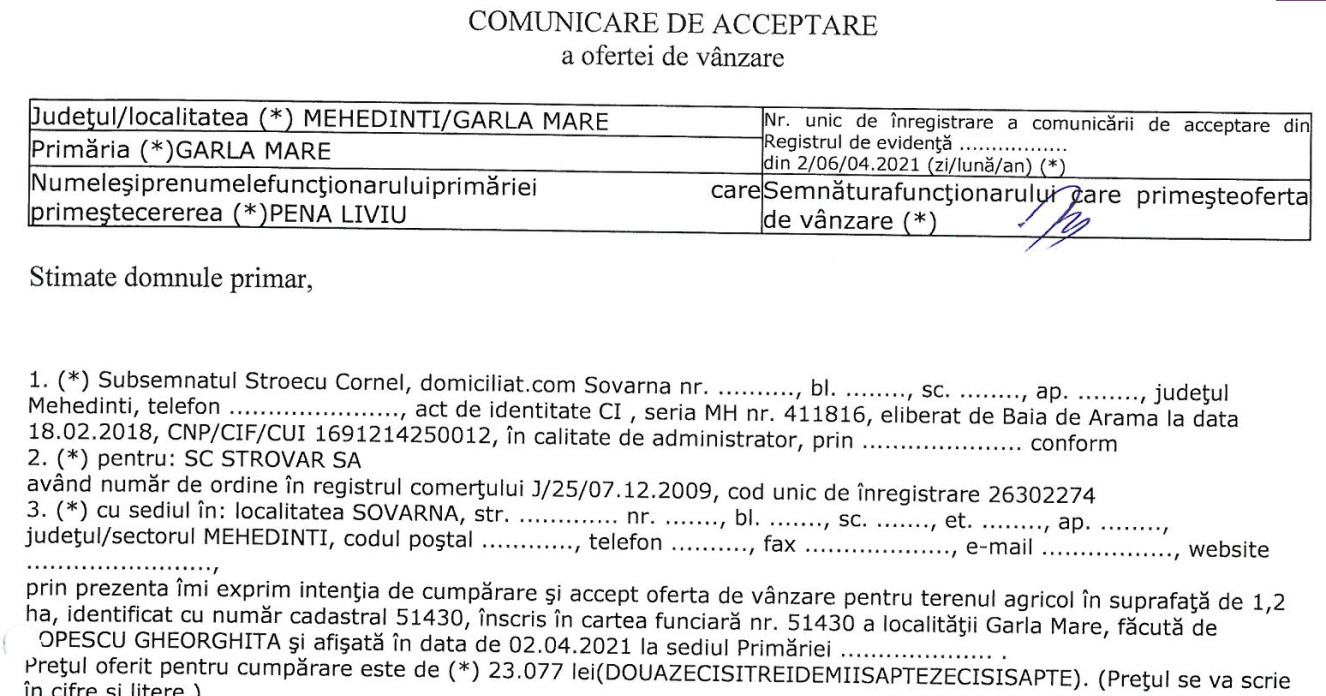
For example, in 2021, at the Gârla Mare Town Hall, in Mehedinți, the „Communication of acceptance of the sale offer” no. 14/02.06.2021 was registered. According to this, Cornel Stroescu bought 1,84 ha of land on behalf as Strovar SA, which he managed, from Alin Claudiu Popescu, for which he paid 27,600 lei. On the same day, the Gârla Mare Town Hall registered another communication accepting a sale offer which saw Stroescu purchase, again on behalf of Strovar SA, a 1.2 ha plot of land from Popescu Gheorghiță, which he paid 23,077 lei for.
The two plots of land bought by Cornel Stroescu became, thus, part of Strovar SA’s assets in the spring of 2021. Just a year and a half later, so well before the 8-year cut-off point, Stroescu sold all of his shares in Strovar SA’s to Ilchovski – including the two plots.
According to the law, if Strovar SA, respectively Stroescu, were to sell these lands before the 8-year mark, i.e. before 2029, they would have had to pay the tax of 80% of the difference in the value of the lands between the two transactions – that is, the value of the lands between the spring of 2021, and December 2022, when Strovar SA was sold to Ilchovski.
We reach the eternal conclusion: that Romania not only has bad laws, but that applying them is, often, optional
And here lies a big dilemma. Why is it that, in December 2022, Cornel Stroescu said that he had sold only 20% of the shares to Ilchovski, stating that „it is a package of 20% of the shares”, but – from the records of the Trade Register – it appears that Stroescu actually sold Ilchovski 100% of the Strovar shares SA and Hastro SRL? Was there a hidden deal between Stroescu and Ilchovski? Could the stake of this subterfuge be to avoid the 80% tax? Whether the tax was, indeed, paid or not, this dilemma still reveals one fact: that we have bad laws, which have confusing wording, and that their provisions are extremely difficult to verify.
Theoretically, these law provisions were approved to discourage speculative agricultural land transactions. Practically, they are difficult to apply.
Who is there to check when it is that a farmer has actually bought a certain piece of land which he adds to his company’s assets? Who checks what percentage of the assets of the company which the farmer is selling is represented by the value of agricultural land, or whether a company which is being sold had land in its assets which had been bought in 2008, or in 2021? No one checks, because a bad law becomes – automatically – optional.


